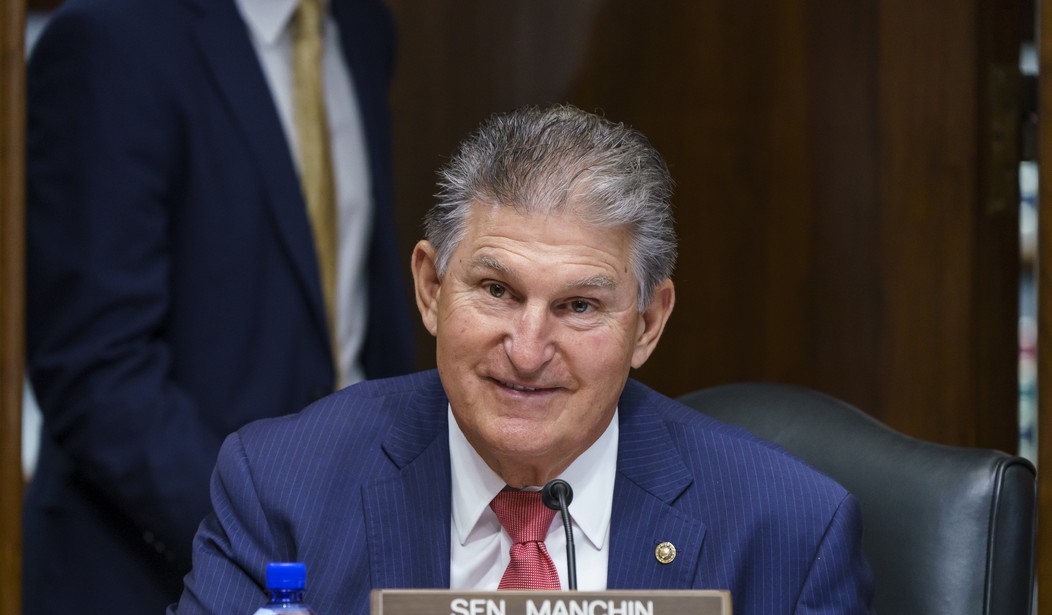C’mon, Joe. Yank the BBB football away from lefties one last time before the midterms. It would be hilarious.
And you now have economic cover to do so.
The “Inflation Reduction Act,” the official name of the Frankenstein version of Build Back Better that Manchin announced a few days ago, might reduce inflation — but only long-term, according to a new Penn Wharton study. Not until after the election.
The 2024 election, that is. Not the midterms.
Until then, the bill could make life slightly *more* expensive, not less.
If that’s not enough to convince Manchin to walk, it’s gotta be enough for soon-to-be Republican Kyrsten Sinema.
Majority party leaders have coined the revamped bill the “Inflation Reduction Act,” aiming to lower prices by reducing the cost of prescription drugs and tweaking tax mandates, as well as creating perks to push Americans and U.S. businesses to make “clean” choices to help fight climate change.
But the new budget modeling predicts the package Democrats are trying to pass along party lines “would very slightly increase inflation until 2024 and decrease inflation thereafter.”
Define ‘slightly’: The inflation impact would be incredibly minor and “statistically indistinguishable from zero,” the report says. So the budget analysts have “low confidence” that the package will have any impact on prices at all.
So the worst-case scenario is that the so-called Inflation Reduction Act will increase inflation a hair, by 0.05 percent. And the likely scenario is that it won’t reduce inflation at all.
That sounds like a winner to me.
Inflation isn’t the only way in which the new bill is deceptive. Manchin and Schumer have touted the fact that it will reduce the deficit by $248 billion over 10 years thanks to the new tax revenue generated by the bill. An average of $24 billion in savings per year is a pittance relative to the size of the federal budget, but it turns out even that figure is grossly overstated. That’s because the bill funds subsidies for ObamaCare health insurance plans only for the next three years instead of 10. Penn Wharton’s analysis notes that if those subsidies are extended for the decade — as they eventually will be by the next several Congresses — then the bill will reduce the deficit by just $89 billion overall or $8.9 billion per year.
To put that in perspective, the average monthly deficit so far this fiscal year is around $53 billion.
Manchin will be on all five Sunday shows this weekend and will doubtless be pressed about this, particularly since Penn Wharton is apparently his budget analyst of choice when making fiscal decisions. I wonder what he thinks about their determination that the bill will have no impact on GDP over the next decade and will boost it by just 0.2 percent over a 30-year timeline. If the bill’s not growing the economy, not reducing the deficit meaningfully, and not bringing down inflation, what’s the point? Was he just super-eager to pass some climate-change measures after all, the endless whining by progressives to the contrary notwithstanding?
Or is he destined to yank the football away again once he digests all of this?
Or — third option — is Sinema going to yank it away? According to the WSJ, despite being looped in on Democratic BBB negotiations for the past 18 months, she was blindsided by the announcement on Wednesday that Schumer and Manchin had reached a deal. The fact that the two didn’t consult with her in coming to terms amounts to a dare — namely, they’re daring her to block a bill she might not like knowing that the entirety of the Democratic Party, including Joe Manchin this time, is behind it. The bill even contains a provision at Manchin’s insistence that Sinema is known to oppose, raising taxes on carried interest. “People that have benefited from carried interest for years and years and years knew that they had a good run. It was long overdue to get rid of and you couldn’t justify it any more,” Manchin said in defense of the tax hike.
He and Schumer are playing chicken with her, believing that she’ll cave and say yes on a vote that will end her career if she goes the other way on it. And they’re not wasting time either, pushing ahead next week on procedural votes to start moving the bill in hopes of passing it before the August recess. Sinema is facing the most pressure on this vote that she’s ever likely to face as a national politician. If she blows it up, the left will hate her more than they do Trump.
Speaking of bills tanking unexpectedly in the Senate, I’ll leave you with Susan Collins’s comments yesterday about the prospects for passing the House’s gay marriage bill. Democrats seemed to be on track to getting 10 Republican votes but Manchin’s BBB deception may lead some GOPers to say no out of spite — which would be irresponsible and even self-sabotaging given how popular gay marriage is nationally. “I just think the timing could not have been worse and it came totally out of the blue,” she said of Manchin’s announcement. “After we just had worked together successfully on gun safety legislation, on the CHIPs bill, it was a very unfortunate move that destroys the many bipartisan efforts that are under way.”








Join the conversation as a VIP Member